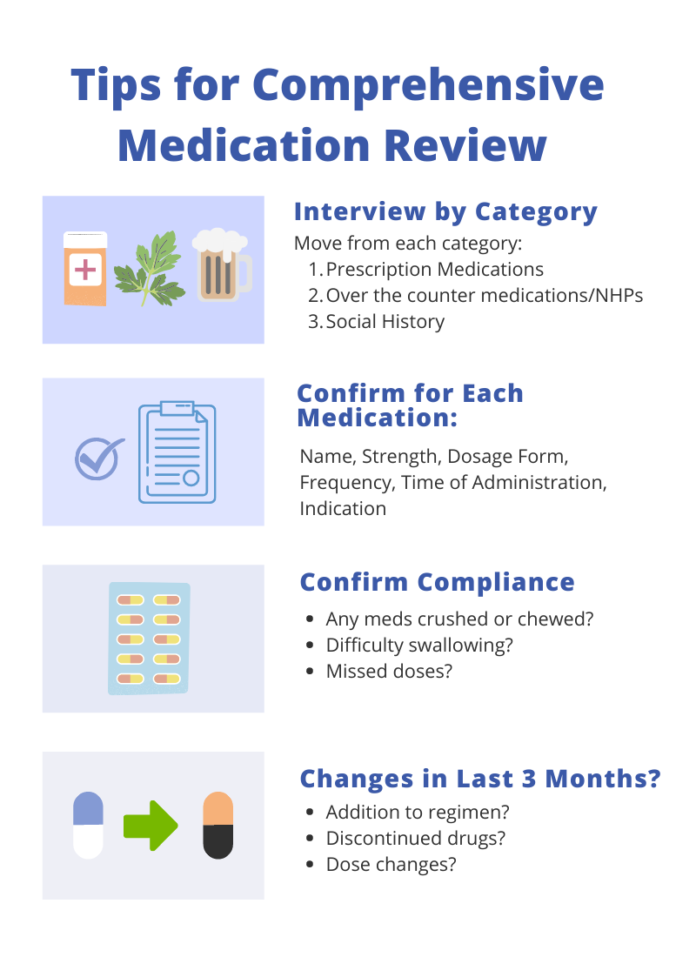By Stephanie Lo, Geoffery Ng, and Certina Ho
Jessica’s Case
Jessica is a 68-year-old patient admitted to the emergency department, presenting with shortness of breath and a decreased level of consciousness. She did not bring her home medications, but her medical care team would like to assess her current medications. Conducting a comprehensive medication history is necessary to determine what and how Jessica has been taking her medications at home, so that the right medical care and medication therapy management can be provided to her at the hospital.
What is a comprehensive medication history?
A medication history is vital to determine the safety and efficacy of a patient’s current medication regimen and guide future medication therapy management. Thus, a medication history must be current, comprehensive, and be able to alert to any potential medication discrepancies. The most common types of medication discrepancies are as follows.
Types of Discrepancy
- Omission discrepancy occurs when a necessary medication is not provided to a patient. This may include home medications not being ordered or administered to the patient while the patient is in hospital, or when discharge medications not being provided or included in discharge prescriptions or instructions when patient is ready to return home.
- Commission discrepancy happens when a patient’s prescription order includes discontinued medications, duplicated medications administered via different routes (e.g., in both oral and parenteral routes) or multiple drugs within the same therapeutic class being co-administered for the same indication.
- Description discrepancy involves missed doses, incorrect/inappropriate strength, extra doses, or different administration times/frequencies of the medication(s) being prescribed.
Transitions of care: Vulnerable moments of medication discrepancies
Medication discrepancies may occur anytime during medication therapy management of a patient but knowing when and where a patient may be most vulnerable to medication discrepancies is key to ensuring patient/medication safety.
| Points of Care | Tips to Prevent Medication Discrepancies |
| Admission | · Conduct a Best Possible Medication History (BPMH) (https://www.ismp-canada.org/download/MedRec/SHN_medcard_09_EN.pdf) prior to admission
· Reconcile admission orders with the BPMH to identify and resolve any medication discrepancies |
| Transfer of Care | · Account for all patient medications via:
o BPMH: Pre-admission medication order o Medication Administration Record (MAR): Currently given medications o Post-transfer medication orders: Medication changes after transfer · Communicate and provide handoff summary between medical care teams |
| Discharge | · Review discharge summary and most current medication list with the medical care team to identify and resolve any medication discrepancies
· Educate and counsel patients on changes about their medications · Communicate with community pharmacy on changes about patient medications |
| Specialized Clinics
(e.g., Day Surgery, Specialist Consults, Mental Health Services, etc.) |
· Conduct a Best Possible Medication History (BPMH) (https://www.ismp-canada.org/download/MedRec/SHN_medcard_09_EN.pdf) prior to clinic visits
· Communicate recent medication changes as a result of the clinic visit with healthcare providers involved in the patient’s circle of care |
Resources for Conducting a Comprehensive Medication Review
There are many existing resources that outline the steps in completing a comprehensive medication review by healthcare providers. For example:
- Top 10 Practical Tips for Interviewing Patients (https://www.ismp-canada.org/primarycaremedrecguide/2_interviewingPatients.htm)
- Best Possible Medication History Interview Guide (https://www.ismp-canada.org/download/MedRec/SHN_medcard_09_EN.pdf)
We also prepared an infographic (Figure 1) to highlight the tips and stepwise approach involved when conducting a comprehensive medication review. (Insert Figure 1 below)
In addition, patient engagement is key to conducting a successful comprehensive medication review. Aside from medications, it is also important to ask about patient’s social history (Figure 1). A resource that is recommended for healthcare practitioners to introduce to patients to learn more about their medications is as follows:
Returning to Jessica’s case
After conducting a comprehensive medication history with Jessica, it was determined that her shortness of breath (SOB) was likely caused by an incorrect administration of her chronic obstructive pulmonary disease (COPD) medication. Instead of using her COPD inhaler once daily to control and prevent her COPD symptoms, she reported using it only when she had trouble breathing. This “description discrepancy” has likely caused her respiratory symptoms and SOB. After providing her with the proper administration instructions, Jessica experienced significant improvements in her breathing.
Regarding her decreased level of consciousness, it was also revealed when inquiring about her social history (as part of the comprehensive medication history process) that Jessica has been a chronic smoker. She smokes a pack a day but has not been smoking for the past five days. This might explain her decreased mental status and prompt the medical care team to discuss and initiate smoking cessation therapy with her. Since then, Jessica’s mental status has improved and was soon ready for discharge.
Take-home message
Conducting a comprehensive medication review is an essential part of the patient care process, especially at high-risk points/transitions of care. It is a prerequisite for patient/medication safety. Using a stepwise approach (Figure 1) can ensure accuracy and efficiency to the benefit of the patient and care provider.
Stephanie Lo and Geoffery Ng are PharmD Students at the School of Pharmacy, University of Waterloo; and Certina Ho is an Assistant Professor at the Department of Psychiatry and Leslie Dan Faculty of Pharmacy, University of Toronto.




